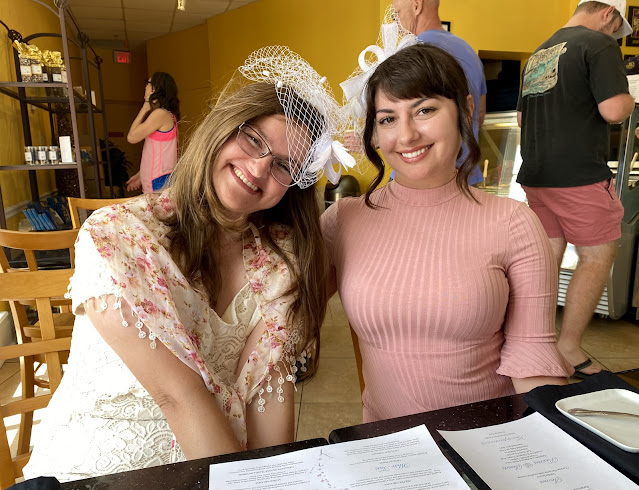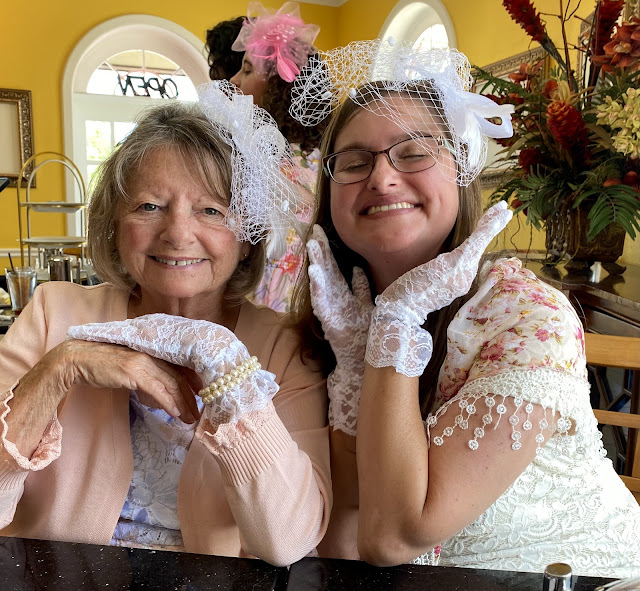My mother and I decided to head down to Sarasota for a little mini trip. Our first stop was to meet my mother’s cousin Mary and her husband Kelly at O’Leary’s Tiki Bar and Grill.
 |
| Mary and mom. |
 |
Myself, Mary, and mom.
|
 |
| Mom, Mary, and Kelly. |
 |
| Mom, Mary, and myself. Photo by Kelly Rolfe. |
Later that evening my mom and I watched the sunset on Siesta Key.
Mom and I checking out of the hotel the next morning and ready to spend the day at The Ringling Museum.
One of the dying but still vibrant leaves of one of lovely plants around the museum.
A serene statue in the rose garden.
Mom in front of one of the massive Banyan Trees.
The path way leading up to the Ca’ d’Zan, the beautiful home of John and Mable Ringling completed in 1926.
The bar with beautiful honeycomb windows.
A lovely antique mirror.
One of the intricate ceilings.
Mom in front of the colorful stained glass doors leading out to the back patio.
 |
| Photo by Teresa Kasper. |
One of the museum guests admiring The Judgement of Paris by Lodovico David, 1690.
Tobias Taking Leave of His Parents by Nicolas Tournier, 1623-1625. The description read as follows:
“The Vulgate Bible’s book of Tobit tells the story of the young Tobias who leaves his parents for an adventure that brings trials, riches, a beautiful wife, and a cure for his father’s blindness. Here, we see the first step of that journey, where a hesitant youth led forward under the guidance of the archangel Raphael glances back at his parents with uncertainty. Each face conveys palpable emotion and humanity, the type of naturalistic effect Tournier adopted from the work of Caravaggio and his followers in Rome.”
A detail of The Vision of Saint Jerome by Johann Liss, 1625.
The musculature of the leg was breathtaking.
Mater Dolorosa by Onorio Marinari, 1670s.
The blue is remarkably vibrant in this painting over 350 years old.
Family Group by Giovanni Antonio Fasolo, 1565. The description read as follows:
“Giovanni Antonio Fasolo is best known for his portraits of nobility from the Veneto, the region encompassing Venice and the surrounding area. While this family has not yet been identified, their high rank is clear: the father’s black robe lined with lynx fur was typical of the Venetian elite. Fasolo makes the father the visual and spiritual support of the family, a steadfast, column-like figure who towers over his offspring. But though he is imposing, he is not without feeling, as seen in the tender clasping of his daughter’s hand.”
A Female Saint, Spanish, 1650.
Plowing in the Nivernais by Rosa Bonheur, 1850.
While the original hangs in Paris, this copy was made by the artist herself. Bonheur was one of the most successful female artists of her time. Her realism and attention to detail are extraordinary.
Victory by the Chiurazzi Foundry, early 20th century.
Moonlight Landscape by Joseph Wright of Derby, 1785.
A close up of the incredible detail.
A detail of Portrait of a Lady by Johann Georg Ziesenis, 1760’s-1770’s.
I just love the delicate lace, her gentle expression, and the little dog cradled in her arm.
Pieter Jacobsz. Olycan by Frans Hals, 1639.
I think this artist did remarkable job capturing the spirit of the sitter, a wealthy brewer and political figure, who looks as though he was in the middle of a lively conversation.
Still Life with Parrots by Jan Davidsz de Heem, late 1640’s. The description reads as follows:
“De Heem is celebrated for luxurious still lifes depicting tables over-laden with ornate glass and silverware, fruit, and crustaceans. Many items here were not indigenous to the Netherlands, including the African gray parrot, the scarlet macaw from Brazil, citrus fruits from southern Europe, and rare shells from the East and West Indies. Glasses of wine and a flagon of beer betoken indulgence, as do the oysters, thought to stimulate sexual appetites. Altogether, these delicacies represent the prosperity and global reach of the Dutch in the seventeenth century.”
This has to be one of the most breathtaking still life paintings I have ever seen. I remember seeing this over 20 years ago on a high school field trip to The Ringling Museum. It is so easy to get lost in this painting. Every inch saturated in lavish color and detail.
A close up of the luminous shells.
A tiny butterfly hanging on to a leaf.
The ornate and shimmering fabric draped over the table.
The reflective silverware (complete with dents) alongside the oysters and fresh fruit.
The detailed underside of a crisp leaf.
The glistening grapes and a tiny ant on one of the ripe peaches.
A grasshopper.
Mom taking pictures of the details.
Madonna and Child, India, Goa, 18th century.
Funerary Jar, China, Neolithic period, 2500 BCE.
Kinrande Bowl, China, Ming dynasty, late 16th century.
Red Underglazed Plate with Fish Motif, China, Ming dynasty, Zhengde period, 1506-1521.
Blue-and-White Pilgrim Flask, China, Ming dynasty, 1403-1424.
Dish with Two Unglazed Carp, China, Southern Song period, 12th-13th century.
Extension by Yoshida Tōshi, 1969.
East and South by Yoshida Tōshi, 1972.
Sound of Temple by Yoshida Tōshi, 1972.
30th Century by Yoshida Tōshi, 1969.
Sleeve Vase with Enamel Decoration, China, Qing dynasty, late 17th-early 18th century.
Stone Statue of Seated Bodhisattva (Guanyin), China, Song dynasty, 10th century.
Myself and mom in the courtyard.
 |
| Photo by Theresa Kasper. |
A delicious late lunch at Venezia Italian Restaurant.
A quick stop at Ben and Jerry’s Ice Cream.
Taking a photo of the Sunshine Skyway Bridge on the way home.

































